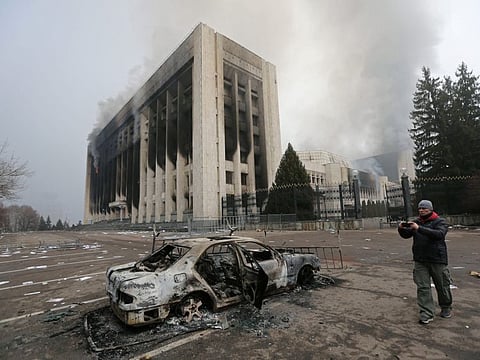Russian troops arrive to help Kazakh government
Protests turn deadly as overnight clashes see dozens killed, including officers: Ministry

Moscow: Kazakhstan’s sweeping anti-government protests turned deadly early Thursday, as overnight clashes saw “dozens” of demonstrators “eliminated,” authorities said, and Russian troops arrived to help the government. At least eight law enforcement officers have been killed, and more than were 300 injured since protests broke out over the weekend, according to the Interior Ministry.
An Almaty Police Department spokesperson told local media that “extremist forces” attempted to storm several government buildings, including the police department. Video from Russia’s Tass state news agency showed armed security forces engaged in a shootout near the main square of Almaty, Kazakhstan’s largest city.
“Dozens of attackers have been eliminated, their identities are being established,” said spokeswoman Saltanat Azirbek, according to Russian news agency Interfax.
The deadly turn into the protests’ fifth day comes as “peacekeepers” from a Russian-led military alliance began to enter the Central Asian country of about 19 million, hours after a regional leader answered beleaguered Kazakh President Kassym-Jomart Tokayev’s appeal for support. Almaty police have warned residents not to leave their homes as an “anti-terrorism operation” is underway.
Kazakhstan’s Internet was blacked out Thursday, with national banking services reportedly suspended.
Demonstrations that started over the weekend in Kazakhstan’s oil-rich western region over high energy prices spilled over elsewhere, including Almaty. Protesters on Wednesday set several government buildings ablaze and briefly took over the Almaty airport. Part of their anger appeared to be aimed at Nursultan Nazarbayev, the country’s authoritarian former president, who continues to exert significant power behind the scenes under the official title of “father of the nation.”
Armenian Prime Minister Nikol Pashinyan, who chairs a council within the Collective Security Treaty Organization, a group of post-Soviet states, said on Facebook that an unspecified number of troops would be sent to the Central Asian nation “for a limited time period” to “stabilize and resolve the situation.”
The CSTO said forces from Russia, Belarus, Armenia, Tajikistan and Kyrgyzstan would be deployed to Kazakhstan, with the primary goal of protecting state and military facilities. Moscow also sent paratroopers, the organization said, and some Russian forces are already on the ground.
Factfile
Nazarbayev: Former Communist Party chief Nursultan Nazarbayev, now 81, ruled the vast steppe land for years from independence in 1991. In 2019, he stepped down to make way for President Kassym-Jomart Tokayev. Nazarbayev used its vast oil wealth to build a gleaming new capital, Astana — later renamed Nur-Sultan in his honour. Known for its futuristic skyline of skyscrapers and chilly winter temperatures that regularly plunge below minus 20 degrees Celsius (minus 4 degrees Fahrenheit), an observation tower at its centre is topped with a viewing platform where visitors can place their hands on a gold imprint of Nazarbayev’s palm. The old capital Almaty remains the biggest city and commercial hub. Cosmodrome: Kazakhstan is the ninth largest country in the world with an area of more than 2.7 million square kilometres (1.1 million square miles). The vast Kazakh steppe is home to the Russia-leased Baikonur cosmodrome - still the world’s biggest launch pad nearly 60 years after Soviet cosmonaut Yuri Gagarin blasted off from there to become the first man in space. Mixed population: Kazakhs may make up nearly 70 percent of the population (2020) but historically the country has had a large Russian minority. Russians made up more than 40 per cent of its people in the 1970s but their numbers have since fallen back to one in five of the population. Officially home to 130 nationalities, many were deported there in Soviet times as political prisoners, with German, Greek, Tatar, Polish, Korean, Ingush and Georgian Turk communities springing up across the steppe. Heavily dependent on oil: Kazakhstan is Central Asia’s biggest economy which has in the past seen double-digit growth. But it was hit hard by a 2014 plunge in oil prices on which it is heavily dependent. It was also affected by the 2008 economic crisis in Russia, which led to a devaluation of the Kazakh currency, the tenge. Oil accounted for 21 per cent of the country’s Gross Domestic Product in 2020, according to the World Bank, which predicts the economy will grow by 3.7 percent this year. The country’s main oilfield Tengiz produces a third of Kazakhstan’s annual output and is 50-per cent controlled by US firm Chevron. The world’s biggest producer of uranium, Kazakhstan is also overflowing with manganese, iron, chromium and coal. Kazakhstan has linked the future of its economy to neighbouring China, investing heavily in its road network, railways and port infrastructure to facilitate trade links.
More than 1,000 people have been injured in the protests, Kazakhstan’s Health Ministry said Thursday. Four hundred of them are hospitalized, with 62 in intensive care.
Tokayev’s government quickly restored price caps on liquefied petroleum gas like propane, which powers most vehicles in the country’s west. He also removed Nazarbayev as head of the powerful National Security Council and declared a two-week state of emergency for the entire country. In a televised speech Wednesday, Tokayev accused foreign-funded “terrorist bands” of stoking unrest but did not offer evidence or specify which countries were behind the purported plot.



